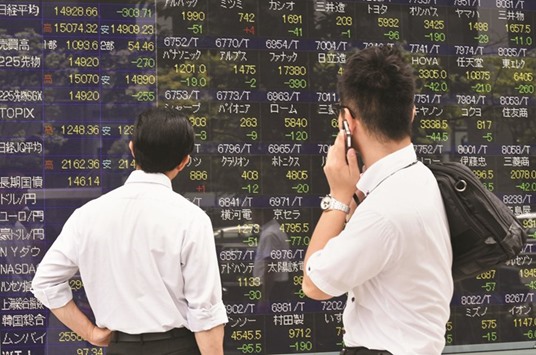Asian stocks rallied yesterday, after gains in equities around the world lifted the mood hours before a meeting of G20 officials kicked off in Shanghai.
In Tokyo, the Nikkei 225 up 0.93% at 16,290.53 points; Shanghai – composite rose 0.73% at 2,760.68 points and Hong Kong - Hang Seng up 1.75% at 19,218.04 points yesterday.
Global equities looked set for their second straight week of gains, with major bourses across Asia higher in early deals after US and European stocks rose overnight.
The rally came as officials from the Group of 20 industrialised nations gathered for a two-day meeting in Shanghai, with China’s slowing growth expected to loom over the discussions.
Chinese stocks gained after the head of the central bank said the world’s number two economy is strong, and promised it still has enough monetary policy firepower to keep it on track.
Tokyo also rose in early deals, helped by a weaker yen, after government data showed Japan’s inflation rate fell to zero in January.
“The tone across equity markets was generally better overnight,” Cameron Bagrie, chief economist at ANZ Bank New Zealand, was quoted saying by Bloomberg News.
“Amidst market turbulence there is a call to arms for the G-20 to get the global economy back on track. Markets are stressed and vulnerable but it’s not yet a crisis.” Shanghai plunged more than 6% on Thursday, hit by tightening liquidity and concerns a rally that has added 10% since mid-January was overdone given stalling growth.
Cooling growth in China, a key importer of raw materials, has sent commodity and energy prices spinning and saw global stocks notch one of their worst starts to a year in living memory.
Oil fell again on Friday, after news Venezuela plans to meet with other producers in March to see how to stabilise prices boosted in US trading.
At 0130 GMT, the US benchmark was down 16 cents, or 0.48%, at $32.91 and Brent crude off 40 cents, or 1.13%, to $34.31.
The gloomy outlook for the global economy has added to pressure on both governments and central bankers to unleash fresh monetary firepower to help stimulate growth and reassure investors. US Treasury Secretary Jacob Lew has said G20 finance ministers will not deliver an “emergency response” to the market turmoil this week, as the world was not in crisis mode just yet.
Zhou Xiaochuan, head of the People’s Bank of China, also moved to reassure markets, saying there was no reason for the Chinese currency to keep falling and promising the bank can support growth.
“China still has some monetary policy space and monetary policy tools to address potential downside risk,” he told a conference in Shanghai on Friday ahead of the G20 meeting.
In Japan, news that inflation fell to zero in January also raised concerns about the world’s third-largest economy as it tries to shake off years of falling prices.
The news is a fresh blow for Prime Minister Shinzo Abe after three years of trying to kick-start growth with a raft of policies that includes government spending and a massive central bank bond-buying programme.
Also in Tokyo, shares in Sharp plunged 14% after the parent company of Taiwann’s Foxconn delayed signing a definitive agreement to take control of the Japanese electronics maker.
Foxconn said the decision to delay was because of “new material information,” which Bloomberg News reported could include more than 300bn yen of liabilities.

Pedestrians look at a share prices board in Tokyo. The Nikkei 225 closed up 0.93% at 16,290.53 points yesterday.
